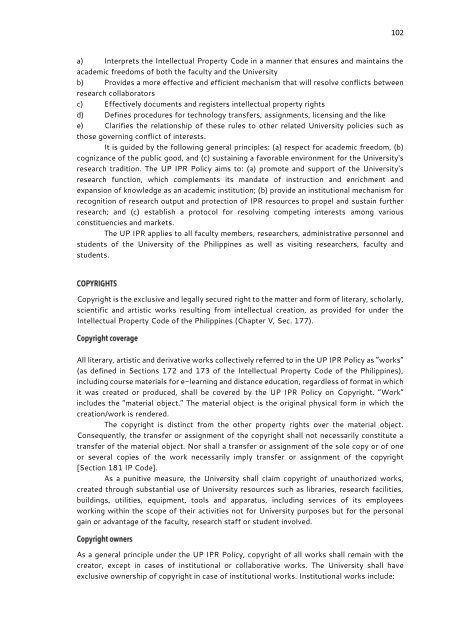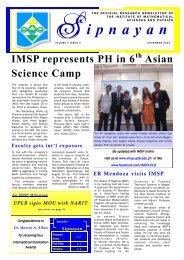A up RESEARCH GUIDEBOOK
33DSJ3
33DSJ3
Create successful ePaper yourself
Turn your PDF publications into a flip-book with our unique Google optimized e-Paper software.
102<br />
a) Interprets the Intellectual Property Code in a manner that ensures and maintains the<br />
academic freedoms of both the faculty and the University<br />
b) Provides a more effective and efficient mechanism that will resolve conflicts between<br />
research collaborators<br />
c) Effectively documents and registers intellectual property rights<br />
d) Defines procedures for technology transfers, assignments, licensing and the like<br />
e) Clarifies the relationship of these rules to other related University policies such as<br />
those governing conflict of interests.<br />
It is guided by the following general principles: (a) respect for academic freedom, (b)<br />
cognizance of the public good, and (c) sustaining a favorable environment for the University's<br />
research tradition. The UP IPR Policy aims to: (a) promote and s<strong>up</strong>port of the University's<br />
research function, which complements its mandate of instruction and enrichment and<br />
expansion of knowledge as an academic institution; (b) provide an institutional mechanism for<br />
recognition of research output and protection of IPR resources to propel and sustain further<br />
research; and (c) establish a protocol for resolving competing interests among various<br />
constituencies and markets.<br />
The UP IPR applies to all faculty members, researchers, administrative personnel and<br />
students of the University of the Philippines as well as visiting researchers, faculty and<br />
students.<br />
Copyright is the exclusive and legally secured right to the matter and form of literary, scholarly,<br />
scientific and artistic works resulting from intellectual creation, as provided for under the<br />
Intellectual Property Code of the Philippines (Chapter V, Sec. 177).<br />
All literary, artistic and derivative works collectively referred to in the UP IPR Policy as “works”<br />
(as defined in Sections 172 and 173 of the Intellectual Property Code of the Philippines),<br />
including course materials for e-learning and distance education, regardless of format in which<br />
it was created or produced, shall be covered by the UP IPR Policy on Copyright. “Work”<br />
includes the “material object.” The material object is the original physical form in which the<br />
creation/work is rendered.<br />
The copyright is distinct from the other property rights over the material object.<br />
Consequently, the transfer or assignment of the copyright shall not necessarily constitute a<br />
transfer of the material object. Nor shall a transfer or assignment of the sole copy or of one<br />
or several copies of the work necessarily imply transfer or assignment of the copyright<br />
[Section 181 IP Code].<br />
As a punitive measure, the University shall claim copyright of unauthorized works,<br />
created through substantial use of University resources such as libraries, research facilities,<br />
buildings, utilities, equipment, tools and apparatus, including services of its employees<br />
working within the scope of their activities not for University purposes but for the personal<br />
gain or advantage of the faculty, research staff or student involved.<br />
As a general principle under the UP IPR Policy, copyright of all works shall remain with the<br />
creator, except in cases of institutional or collaborative works. The University shall have<br />
exclusive ownership of copyright in case of institutional works. Institutional works include:




